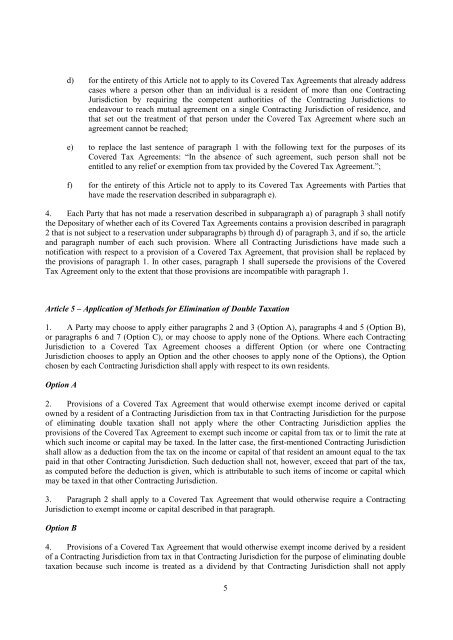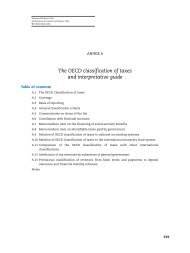TO PREVENT BASE EROSION AND PROFIT SHIFTING
multilateral-convention-to-implement-tax-treaty-related-measures-to-prevent-BEPS
multilateral-convention-to-implement-tax-treaty-related-measures-to-prevent-BEPS
Create successful ePaper yourself
Turn your PDF publications into a flip-book with our unique Google optimized e-Paper software.
d) for the entirety of this Article not to apply to its Covered Tax Agreements that already address<br />
cases where a person other than an individual is a resident of more than one Contracting<br />
Jurisdiction by requiring the competent authorities of the Contracting Jurisdictions to<br />
endeavour to reach mutual agreement on a single Contracting Jurisdiction of residence, and<br />
that set out the treatment of that person under the Covered Tax Agreement where such an<br />
agreement cannot be reached;<br />
e) to replace the last sentence of paragraph 1 with the following text for the purposes of its<br />
Covered Tax Agreements: “In the absence of such agreement, such person shall not be<br />
entitled to any relief or exemption from tax provided by the Covered Tax Agreement.”;<br />
f) for the entirety of this Article not to apply to its Covered Tax Agreements with Parties that<br />
have made the reservation described in subparagraph e).<br />
4. Each Party that has not made a reservation described in subparagraph a) of paragraph 3 shall notify<br />
the Depositary of whether each of its Covered Tax Agreements contains a provision described in paragraph<br />
2 that is not subject to a reservation under subparagraphs b) through d) of paragraph 3, and if so, the article<br />
and paragraph number of each such provision. Where all Contracting Jurisdictions have made such a<br />
notification with respect to a provision of a Covered Tax Agreement, that provision shall be replaced by<br />
the provisions of paragraph 1. In other cases, paragraph 1 shall supersede the provisions of the Covered<br />
Tax Agreement only to the extent that those provisions are incompatible with paragraph 1.<br />
Article 5 – Application of Methods for Elimination of Double Taxation<br />
1. A Party may choose to apply either paragraphs 2 and 3 (Option A), paragraphs 4 and 5 (Option B),<br />
or paragraphs 6 and 7 (Option C), or may choose to apply none of the Options. Where each Contracting<br />
Jurisdiction to a Covered Tax Agreement chooses a different Option (or where one Contracting<br />
Jurisdiction chooses to apply an Option and the other chooses to apply none of the Options), the Option<br />
chosen by each Contracting Jurisdiction shall apply with respect to its own residents.<br />
Option A<br />
2. Provisions of a Covered Tax Agreement that would otherwise exempt income derived or capital<br />
owned by a resident of a Contracting Jurisdiction from tax in that Contracting Jurisdiction for the purpose<br />
of eliminating double taxation shall not apply where the other Contracting Jurisdiction applies the<br />
provisions of the Covered Tax Agreement to exempt such income or capital from tax or to limit the rate at<br />
which such income or capital may be taxed. In the latter case, the first-mentioned Contracting Jurisdiction<br />
shall allow as a deduction from the tax on the income or capital of that resident an amount equal to the tax<br />
paid in that other Contracting Jurisdiction. Such deduction shall not, however, exceed that part of the tax,<br />
as computed before the deduction is given, which is attributable to such items of income or capital which<br />
may be taxed in that other Contracting Jurisdiction.<br />
3. Paragraph 2 shall apply to a Covered Tax Agreement that would otherwise require a Contracting<br />
Jurisdiction to exempt income or capital described in that paragraph.<br />
Option B<br />
4. Provisions of a Covered Tax Agreement that would otherwise exempt income derived by a resident<br />
of a Contracting Jurisdiction from tax in that Contracting Jurisdiction for the purpose of eliminating double<br />
taxation because such income is treated as a dividend by that Contracting Jurisdiction shall not apply<br />
5



